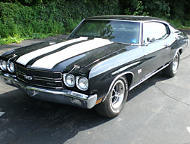9/4/2009
Washington Supreme Court Protects Innocent Owners from Car SeizureWashington State Supreme Court rules that vehicles may not be seized from owners who have not committed any crime.

Law enforcement agencies in Washington will no longer be able to confiscate automobiles from innocent vehicle owners thanks to a ruling handed down yesterday by the state's highest court. The Supreme Court of Washington ordered the return of a 2004 Nissan Sentra and a 1970 Chevrolet Chevelle that the Snohomish Regional Drug Task Force had grabbed from the parents of Thomas E. Roos, 27.
Problems for the younger Roos began when he was first caught on June 10, 2005 driving in the Nissan with illicit drugs and a lot of cash. The Nissan was impounded, but Roos was able to forge his father's signature to retrieve it from the lot before his parents found out. By September, he had been arrested three more times and the task force had permanently confiscated both cars.
Alan and Stephne Roos first appeared before an administrative hearing in February 2006 to assert that they had no idea when they gave their son permission to borrow the automobiles that he would use them for drug dealing. The hearing officer decided that the parents' actual knowledge was not relevant because "they had a reason to know." The hearing officer, a Snohomish County sheriff's employee, ruled that the vehicles should be kept for the benefit of the Snohomish County sheriff's task force.
Upon review, the high court did not believe this procedure was consistent with the legislature's explicit intention of protecting innocent owners. The state law in question only authorizes vehicle confiscation if a crime was committed with "the owner's knowledge or consent," although the law does shift the burden to the vehicle owner to prove his own innocence.
"We assume the legislature means exactly what it says and interpret the wording of statutes according to those terms," Justice Charles W. Johnson wrote for the majority. "This legislative choice also makes sense in the overall context of what is occurring... Perhaps a person should know many things, but often the opposite could be true, like here: The parents could have just as easily presumed their son's criminal activities would stop after the first arrest just as they could have suspected their son's criminal activities would continue."
The court noted that Thomas Roos did not live with his parents and that the youth lived a "secretive" life. Thomas Roos did everything he could to hide his activities from his parents.
"We do not have sufficient objective facts here to determine the subjective knowledge of Alan and Stephne during the relevant time period of Thomas' criminal activity involving his parents' vehicles," Johnson concluded. "As such, we cannot agree with the trial court and the court of appeals that Thomas' parents had actual knowledge but simply stuck their heads in the sand."
Justice Barbara A. Madsen disagreed, insisting that the word 'knowledge' could have many meanings. She also argued that the confiscation statute uses civil procedures so that those who have not committed any crime may still be punished.
"The plain meaning rule rested on theories of language and meaning, now discredited, which held that words have inherent or fixed meanings," Madsen wrote in her dissent. "What is clear is that our legislature did not write the innocent owner exception to allow everyone save the person who committed the crime giving rise to forfeiture to qualify as an innocent owner."
Madsen's dissent allowed that the Nissan economy car should be returned, but that the classic Chevelle should be kept by the task force. Because only four of the nine justices agreed with the Madsen approach, both cars will be reunited with their owners.
A copy of the decision is available in a 130k PDF file at the source link below.


